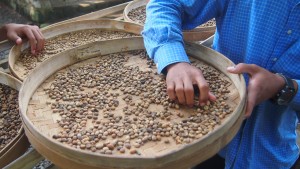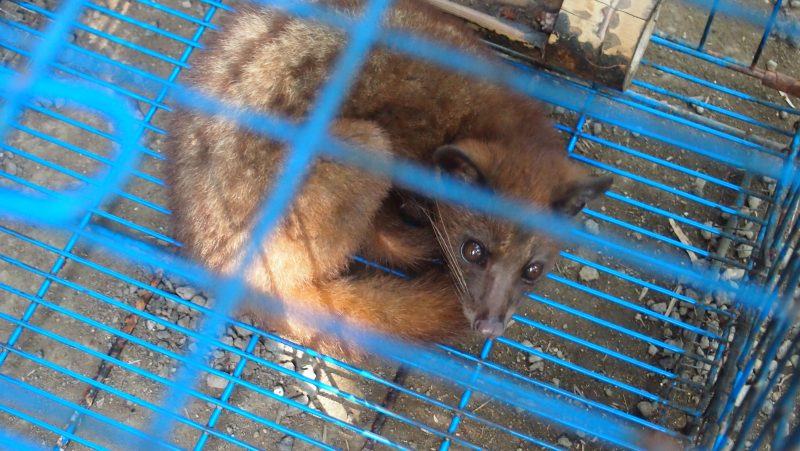In Bali, the high demand for luwak coffee has created a ruthless industry built on immense animal suffering and an inferior product.
Kopi luwak, or coffee produced from beans that have passed through the digestive tract of Asian palm civets (luwak), has been a growing worldwide trend among coffee connoisseurs. Little do they know that most of the luwak coffee produced in Bali comes at a price, much higher than what coffee lovers fork out for a supposed quality product.
Traditionally, luwak coffee beans were sourced from wild civets, with villagers harvesting them from the forest floor and selling them to producers. In fact, it was coffee plantation workers employed by the Dutch during Indonesia’s colonial era who first discovered the unique brew. Prohibited from picking coffee beans for their own consumption, the farmers resorted to collecting the beans contained in civet droppings. It soon became apparent that once cleaned and roasted, the fermented beans resulted in a smooth cup of coffee.
Unfortunately, due to the growing demand for coffee luwak and producers trying to maximize profits, the traditional method of collecting civet droppings has given way to a battery cage system. Today most of Bali’s luwak coffee is produced from beans sourced from caged civets that often live in appalling conditions and are force fed coffee beans.
Janice Girardi, the founder of Bali Animal Welfare Association (BAWA), says that she has heard of only one kopi luwak plantation on the island that is trying to source its beans from wild civets. “Collecting the droppings is a very labour-intensive process and most producers choose the easy way out, which usually involves keeping civet cats in captivity and in inhumane conditions.”
During the peak tourist season, BAWA receives many complaints from distressed tourists who are distraught about the conditions in which the civets are kept at luwak coffee plantations. BAWA investigates many such complaints by paying visits to such producers. “BAWA’s findings have been shocking. The captive kopi luwak industry causes discomfort, pain and distress to civets. The animals are shy and nocturnal yet often they are forced to live in glaring artificial light with other animals and tourists ‘gawking’ at them. People poke at them with their fingers, through their cages,” Girardi says.
While most producers do not even try to hide the fact that their kopi luwak comes from caged civets, some claim that their coffee is made from beans sourced from civets in the wild while this in fact is far from reality. An investigation conducted by People for the Ethical Treatment of Animals revealed that many producers mislabel their coffee claiming that it is sourced from wild civets, while in fact it comes from incarcerated civets. Not only unethical, such mislabelling means that consumers are not getting the kind of product they are paying for.
In the past, the coffee luwak production process began with wild civets prowling the jungle to select the juiciest, ripest coffee cherries. This resulted in high quality coffee beans. Caged civets are forced to eat huge quantities of inferior quality beans, which in turn results in a product of inferior quality.
The kopi luwak industry in Indonesia is largely unregulated. The country’s animal protection laws are weak, largely irrelevant and rarely enforced. “There are many inhumane animal practices in Bali and Indonesia that should be regulated, including the cruel use of civet cats for profit,” Girardi says. “BAWA has studied the relevant laws with legal counsel and advocates stronger laws, better enforcement and tougher penalties for offences against animals. There is so much animal cruelty here that in most other environments would be criminal.”
BAWA has started a Responsible Tourism programme that urges tourists to research attractions and other facilities that rely on animals before they visit them in order to avoid supporting animal cruelty.
“We urge people not to purchase coffee luwak that is produced by civets in captivity. If there is no demand, then the production, and its associated cruelty, will come to a halt,” Girardi says.
“We work hard to educate school children and communities about the importance of respect for animals. We also work to reform Indonesia’s animal protection laws. This is one of our biggest challenges and requires far more resources than we currently have.”
Change can start with all of us, and the average person can do a lot to stop the cruelty in the coffee luwak industry. Janice says that it is best to stay away from Bali’s luwak coffee as most of it comes from caged civets, even the coffee luwak promoted as 100 percent cage-free. “People should refrain from visiting farms that have captive civets and should not support operators who offer tours to such facilities,” Girardi says. “Also, anybody can write a letter to their local Indonesian Embassy calling for a ban on keeping and farming civets for coffee luwak, and the strengthening and enforcement of laws to protect the welfare of wild and domestic animals in Indonesia.”
Janice says that the future of the industry in Bali depends on the producers and the public. “If the producers who are sourcing humanely from wild civets promote that and are supported by consumers, it might encourage those who continue to use caged civets to change. If consumers and retailers refuse to buy from farms using captive civets, lack of demand for their products will force such producers to change their practices or to fold,” Girardi says. “This kind of change is not going to happen overnight. The real key to change is getting Indonesia’s animal protection laws improved and enforced with tough penalties for offenders. This is work in progress.”
Please report any cases of abuse to tour operators, retailers of coffee luwak, as well as to BAWA (preferably in writing and with photographic/video evidence). Also, BAWA is looking for anyone with legal expertise willing to donate a bit of time. Email: info@balianimalwelfare.com.




